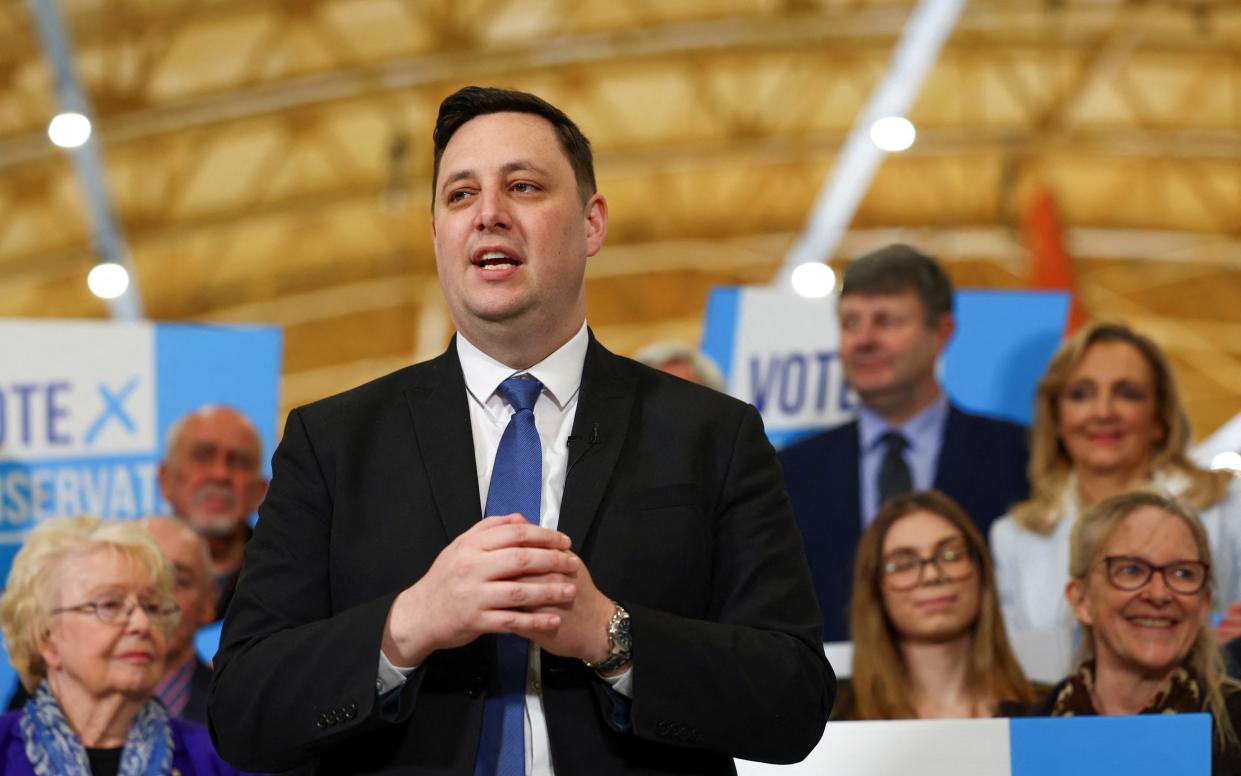Letters: Ben Houchen’s success in Tees Valley contains a crucial lesson for the Conservative Party

SIR – I have been reading with some amusement the various comments on the Conservatives’ abysmal showing at the local elections (report, May 5).
The only real positive appeared to be the re-election of Ben Houchen as Tees Valley mayor, which some have suggested was an endorsement of Rishi Sunak’s leadership and the Conservative Party in general.
The truth is that there is an immense difference between Lord Houchen and the Conservative Government. Lord Houchen makes promises and then delivers on them. That is why he was re-elected. The Government, on the other hand, makes lots of promises and then delivers nothing. That is why the Tories were trounced in the polls.
Ian Coates
Darlington, Co Durham
SIR – In the West Midlands we have seen probably one of the best politicians in the country lose his position for being in the wrong party. During his seven years as mayor, Andy Street saw through a whole range of excellent local projects.
We now have yet another grey Labour person taking his place. This, in conjunction with the disastrous performance of the Labour-run Birmingham council, doesn’t bode well for the area.
Howard Clay
Bournville
SIR – Susan Hall put up a good fight against Sadiq Khan to be Mayor of London, but she lost.
When selecting the candidate to take on Mr Khan, would it not have been prudent to choose a well-known personality? Boris Johnson won twice, despite London normally having a Labour bias. Surely there was a lesson in this. A well-liked celebrity with a bit of pizzazz would probably have beaten the dour Mr Khan. I hope the powers that be show a bit more political savvy next time.
John Twitchen
Leigh-on-Sea, Essex
SIR – Despite the disastrous local election results, Rishi Sunak and his ministers are still not getting the message.
They appear to believe that their plan will eventually be embraced by the electorate. But it won’t: when the general election arrives, Conservative voters will either sit on their hands or give their support to the no-hope Reform UK, which at least has conservative policies.
Richard North
Stanford Dingley, Berkshire
SIR – Again and again I hear the warning: “Vote Reform, get Labour.”
The trouble is that if you vote Conservative, you don’t get Conservative.
Idris White
Sevenoaks, Kent
SIR – Although replacing Rishi Sunak as Conservative leader is unlikely to win the general election for the Tories (Comment, May 4), there is surely a good chance that it would reduce the number of seats they lose.
Alan Hetherington
York
SIR – Heaping the blame for the local election results on to Rishi Sunak is unjust. He has had to deal with scandals, warring factions and a crashed economy, thanks to Liz Truss.
It is highly commendable that, in the face of all these challenges, he remains calm and determined. He deserves support, not criticism.
Anthony Haslam
Farnham, Surrey
SIR – People are complaining about voter apathy in the local elections, but I would suggest that our candidates were also apathetic. We received no canvassing, and only one party sent material. No one knocked on the door. If one had ignored the press, the whole event would have gone unnoticed.
J L Greenwood
London SW18
‘Safe’ assisted dying
SIR – Lord Falconer (Letters, May 4) has a curious confidence in “safeguards and oversight” when it comes to the matter of assisted dying. Nothing works in this country. I sense another scandal in the offing, with no way to “compensate” the unwilling dead.
Jacqueline Block
London NW11
SIR – Lord Falconer fails to controvert my point that “assisted dying” is a vague, confusing euphemism – a point illustrated by his own expansive explanation of it in his podcast.
He claims that the Health and Social Care Committee clearly defined the term, but its definition of “assisted dying/assisted suicide” was imprecise, not least because voluntary euthanasia was shoehorned in too. “Voluntary euthanasia” and “physician-assisted suicide” – which have long been used by scholars and others on both sides of the debate – are tolerably clear. Why should anyone, especially a leading lawyer such as Lord Falconer, prefer a fuzzy neologism that does not properly distinguish between the two and, moreover, risks confusing them with palliative care and the withdrawal of treatment? An opinion poll in 2021 disclosed that over 40 per cent of respondents thought “assisted dying” meant the right to refuse treatment, and a further 10 per cent the provision of hospice care.
Lord Falconer says the only confusion that arises in public policy discussion comes from those who seek to obfuscate. Obfuscation is precisely what results from the use of this nebulous phrase.
Professor John Keown
Kennedy Institute of Ethics, Georgetown University
Washington DC, United States
SIR – Juliet Buckley (Letters, May 1) takes issue with Mishal Husain’s definition of “euthanasia”, but whether or not it means “a gentle and easy death” the fact remains that it involves deliberately ending someone’s life.
John O’Donnell
West Mersea, Essex
SIR – I am 102. For the past two years I have been in a private care home.
I am not terminally ill. I am not suffering unbearable pain. I am just bored out of my mind. Why should I sit around playing childish games and singing silly songs until I have a stroke or a heart attack and am carted off to hospital to be kept alive for as long as possible? Why cannot I die now in an organised and comfortable way? Why do other people have the audacity to think they know what’s best for me?
Keith Herdman
London SE3
Religion in public life
SIR – We need principled people with a strong sense of service and a belief in more than themselves to seek public office (“Kate Forbes has still won a significant victory – for religion in public life”, Comment, May 2).
The presence of faith among some of our politicians ought to be embraced. Their belief in a higher power means they are accountable to more than just themselves. Moreover, politicians who adhere to a religious belief system adhere to a moral framework – in contrast with the prevailing trend of leaders leaning towards a purely managerial approach, without an ethical grounding.
Such politicians are also likely to recognise the potency of faith and other community structures in effecting social progress. If we dismiss politicians solely because of their religious convictions, it reveals a lack of the tolerance that we often pride ourselves on.
Zaki Cooper
London NW4
SIR – Nick Kester (Letters, May 4) says religion is private. I’m sure the Devil will be pleased to hear that some hold this view, but it couldn’t be further from the truth. Religion can never be private, as the whole point is to spread God’s word and light, even in the face of prejudice, mockery and disbelief.
Anne Healy
Sunderland
Scrapping PCCs
SIR – I received no information about the candidates standing for the position of Police and Crime Commissioner (Letters, April 30) in our area on Thursday. Those who voted presumably had little more to go on – yet this is the person who is going to hold the chief constable to account.
What a waste of public money. Surely this would be better spent putting more constables on the beat. We all know that the police are restricted by a lack of resources.
Trevor Bunce
Saham Toney, Norfolk
Stubble trouble
SIR – Could someone explain why so many men now sport scruffy, quarter-grown beards? It is an awful trend, and the look ages most of them by at least 10 years. They must be distinctly unpleasant to rub up against – a bit like kissing a pig’s back, I would imagine.
Thank heavens my husband of almost 50 years agrees with me.
Louise Broughton
Arnside, Westmorland
The perfect person to get a piano in tune

SIR – With regard to Ivan Hewett’s article (Arts, May 1) about tuning Steinway pianos, when my father was in the Middle East during the war he attended a concert given in an old arena (said to have been built for the Queen of Sheba).
The place was packed with troops of all nationalities, but when the pianist arrived and sat down to perform, he announced after a couple of notes that the instrument was so out of tune that it was unplayable. Amid great consternation, an American voice shouted: “We’ve got a member of the Steinway family here – will he do?” The man came on stage and rectified things – and the concert went ahead to great success.
Joan Clayton
Twickenham, Middlesex
Rounding off business with a bottle of ale
SIR – I once had a meeting at the then Midland Bank in Oxford Circus in the mid-1970s.
Once business had been concluded (it was around 11 am), the manager – a Mr Muir, as I recall – asked if I would like a coffee. He then said, “I am going to have a light ale myself,” and proceeded to reach under his desk and produce a bottle (Letters, May 4).
A lovely man and a proper bank manager, to whom I remained loyal.
Terry Lazenbury
Burnham Green, Hertfordshire
SIR – On one occasion many years ago I needed to consult my bank manager. I arrived a little early and was told that he had not yet returned from lunch. I therefore wandered off into town to do some shopping, which included the purchase of a bottle of good red wine.
When I returned I was shown into the manager’s office. I put the bottle on a side table and we got down to business. After this was completed and I got up to leave, the manager thanked me for my generous gift. I did not have the courage to disabuse him.
Mike Aston
Stourbridge, Worcestershire
SIR – Rupert Godfrey (Letters, May 1) recalls a boozy job interview in 1980. Years ago, I was invited to a third interview at a luxury cosmetics company with the European vice-president. It was unclear whether it was meant to be “formal” but I dressed for this, and was shown into an office and introduced to a charming Robert Redford lookalike.
“So,” he said, casting an eye over my CV, “I see you like tennis.”
“Er, yes,” I replied.
“My mixed doubles partner has let me down on Sunday – are you free?”
“Er, yes,” I replied again.
We played, we won and I got the job. I later learnt that I had already been hired, but the tennis game gave me an insight into his competitive nature. He became my biggest supporter and we had a great working relationship.
Linda J Walton
London W14
Letters to the Editor
We accept letters by email and post. Please include name, address, work and home telephone numbers.
ADDRESS: 111 Buckingham Palace Road, London, SW1W 0DT
EMAIL: dtletters@telegraph.co.uk
FOLLOW: Telegraph Letters on Twitter @LettersDesk
NEWSLETTER: sign up to receive Letters to the Editor here


